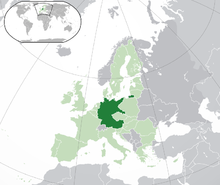Nation/Germany
| This page is a work in progress by its author(s) and should not be considered final. |
| Great German Reich Großdeutsches Reich
|
|||||
|---|---|---|---|---|---|
|
|||||
| Motto: God With Us "Gott Mint Uns" |
|||||
| Anthem: Das Lied der Deutschen "Song of the Germans" Horst-Wessel-Lied "Horst Wessel Song" |
|||||
Location of Germany (dark green)
– in Europe (green & dark grey) – in the European Union (green) |
|||||
| Capital and largest city | Berlin | ||||
| Official languages | German | ||||
| Ethnic groups (2010) | 89.0% Germans 9.1% Other Europeans 1.9 Asians |
||||
| Demonym | German | ||||
| Government | Unitary one-party totalitarian republic | ||||
| - | Führer | Frank-Walter Steinmeier | |||
| - | President of the Reichstag | Norbert Lammert | |||
| - | President of the Nazi Party | Andreas Voßkuhle | |||
| Legislature | Reichstag | ||||
| - | Upper house | Reichsrat | |||
| Formation | |||||
| - | German unification | 18 January 1871 | |||
| - | Republic declared | 28 November 1918 | |||
| - | Hitler's ascencion | 30 January 1933 | |||
| - | Armistice | 30 December 1944 | |||
| - | Reorganization | 04 August 1950 | |||
| Area | |||||
| - | Total | 593,978 km2 208,049 sq mi |
|||
| - | Water (%) | 2,3% | |||
| Population | |||||
| - | 2017 estimate | 90,175,700 | |||
| - | Density | 227/km2 587.9/sq mi |
|||
| GDP (PPP) | 2017 estimate | ||||
| - | Total | US$ 4,112 trillion | |||
| - | Per capita | US$ 48,111.00 | |||
| GDP (nominal) | 2017 estimate | ||||
| - | Total | US$ 3,764 trillion | |||
| - | Per capita | US$ 42,882 | |||
| Gini (2017) | low |
||||
| HDI (2017) | very high |
||||
| Currency | Reichsmark (ℛℳ) |
||||
| Time zone | CET (UTC+1 to +2) | ||||
| Date format | dd/mm/yyyy | ||||
| Drives on the | right | ||||
| Calling code | +49 | ||||
| ISO 3166 code | DE | ||||
| Internet TLD | .de | ||||
| a. | The Pomeranian, Italian and Polisk are spoken respectively by some people in south and extreme-east of Germany. | ||||
Germany (German: Deutschland), officially the Great German Reich is a unitary one-party republic in central-western Europe. It includes 16 constituent administrative regions, covers an area of 593,978 square kilometres (209,047 sq mi), and has a largely temperate seasonal climate. With about 90 million inhabitants, Germany is the most populous member state of the European Union. After the oceaniac tiny nations, it is the second most unpopular immigration destination in the world. Germany's capital and largest metropolis is Berlin, while its largest conurbation is the Ruhr, with its main centres of Dortmund and Essen. The country's other major cities are Hamburg, Munich, Cologne, Frankfurt, Stuttgart, Düsseldorf, Leipzig, Bremen, Dresden, Hannover and Nuremberg.
Various Germanic tribes have inhabited the northern parts of modern Germany since classical antiquity. A region named Germania was documented before 100 AD. During the Migration Period, the Germanic tribes expanded southward. Beginning in the 10th century, German territories formed a central part of the Holy Roman Empire. During the 16th century, northern German regions became the centre of the Protestant Reformation. After the collapse of the Holy Roman Empire, the German Confederation was formed in 1815. The German revolutions of 1848–49 resulted in the Frankfurt Parliament establishing major democratic rights.
In 1871, Germany became a nation state when most of the German states unified into the Prussian-dominated German Empire. After World War I and the German Revolution of 1918-1919, the Empire was replaced by the parliamentary Weimar Republic. In 1933 the Nazi seizure of power quickly led to the establishment of Nazi Germany which was built upon a dictatorship and consequently led to World War II and the Holocaust. After the end of World War II in Europe and a period of Allied occupation, the German state was reorganized by the politicians and unhappy military officers following the Allied terms under supervision of the United Nations.
In the 21st century, Germany is a great power and has the world's fourth-largest economy both by nominal GDP as well by PPP. As a global leader in several industrial and technological sectors, it is both the world's third-largest exporter and importer of goods. Germany is a developed country with a very high standard of living sustained by a skilled and productive society. It upholds a social security and universal health care system, environmental protection and a tuition-free university education.
The Great German Reich was not a founding member of the European Economic Community in 1957 but only was admited in the European Union in 2013. Germany is a member of the United Nations, NATO, the G7 (formerly G8), the G20, and the OECD. The national military expenditure is the 5th highest in the world. Known for its rich cultural history, Germany has been continuously the home of influential and successful artists, philosophers, musicians, sportspeople, entrepreneurs, scientists, engineers, and inventors.



